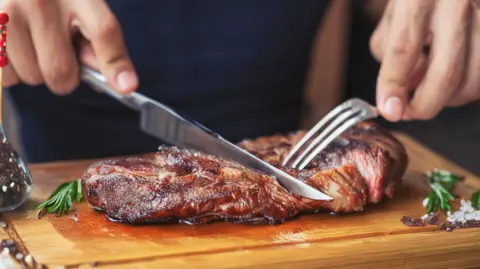Beef drives food inflation to highest in a year
 Getty Images
Getty ImagesHigher beef and fresh produce prices has pushed UK food inflation to an annual high, according to industry data, with the boss of one steakhouse chain telling the BBC the cost of the meat had risen by a fifth.
Food prices rose 2.8% in the year to May, the highest annual rate since May 2024 when food inflation was 3.2%, according to the British Retail Consortium (BRC), which represents supermarkets and other retailers.
Farming industry experts said beef prices in particular have been rising due to high demand and low supply caused by lack of government support.
Tomas Maunier, co-founder of steak restaurant chain Fazenda, said the meat industry faced "tough times".
Mr Maunier, whose Brazilian-inspired steakhouse chain has eight restaurants across the UK, said his firm had passed on about 2% of increased running costs to customers.
"Beef in particular has gone up about 20% in the last 12 months. A big chunk of that has happened in the last six but businesses cannot pass it all on to our guests," he added.
Mr Maunier added that an increase in production costs and an increase in the national minimum wage was also pushing up overall costs, which could be passed onto consumers.
Nick Allen, chief executive of the British Meat Processors Association (BMPA), said competition between supermarkets had previously been keeping the price of beef down, so it was only a matter of time until customers were hit by cost increases.
"Its not surprise. The farm price for beef has been going up and up to the point that its now at record levels," Mr Allen said.
He warned it was a "real struggle" for the industry to keep up with demand for beef, and claimed that "government schemes have not supported production but environmental schemes instead".
Helen Dickinson, chief executive of the BRC, said red meat eaters "may have noticed their steak got a little more expensive" this month.
Jilly Greed, a fourth generation arable farmer and suckler beef producer in Devon, told the BBC: "It is entirely the maths - it's about supply and demand."
"There's a 5% shortfall in cattle on the land, and a 1% increase in consumer demand, and the combination of those factors have really brought price increases," she added.
Ms Greed said price increases have affected the whole supply chain.
"The base product is the highest it's ever been, and sooner or later that has to filter through to the consumer," said Mr Allen.
The Agriculture and Horticulture Development Board, which is funded by farmers and growers, said UK cattle prices have been rising at "unprecedented levels" since the start of 2025.
Its latest beef market update says some of the price rise faced by farmers is feeding through to shoppers - but it said not all of this is being passed on.
